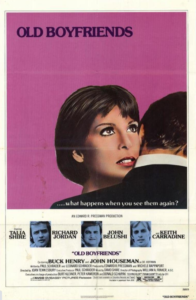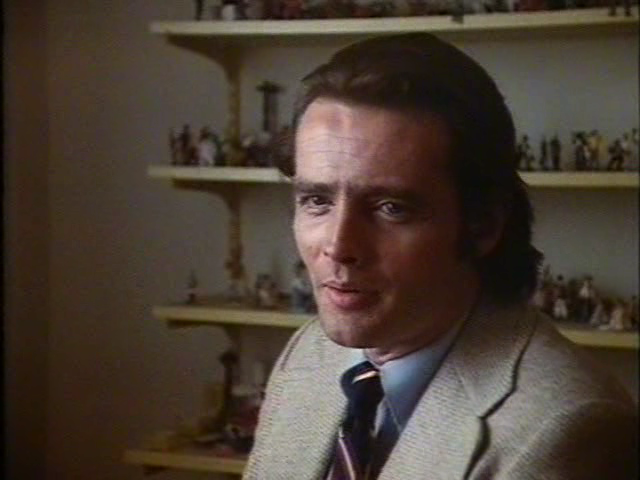“You can’t just pick these things up again like a book you never finished.”
|

Synopsis:
A troubled psychologist (Talia Shire) hoping to understand herself better takes a road trip to reconnect with three of her former beaus — including a college boyfriend (Richard Jordan), a high school flame (John Belushi), and a childhood sweetheart.
|
|
Genres, Themes, Actors, and Directors:
- Character Studies
- John Belushi Films
- Paul Schrader Films
- Road Trip
- Talia Shire Films
Review:
The premise of this succinctly titled character study is compelling: who hasn’t fantasized at some point about revisiting one’s former lovers, and reassessing, in hindsight, what went wrong? Unfortunately, director Joan Tewkesbury — best known for writing Robert Altman’s Nashville (1975) and Thieves Like Us (1974) — fails to turn this intriguing narrative framework into a convincing drama. At the heart of the problem lies Shire’s performance, which is uneven and unfocused; sadly, we never grow to care about her character. Part of the issue also lies in Paul and Leonard Schrader’s screenplay: after an initial voice-over giving a cursory explanation of what Shire’s setting out to do and why, we’re plunged into her road trip without an opportunity to feel any investment in her or her dilemma. The surprisingly lame dialogue doesn’t help matters any either (Shire says to her womanizing ex-boyfriend Belushi — who now runs a formal wear company — “I always knew you’d get into women’s clothes – but this is ridiculous!” Ha.) Meanwhile, David Shire’s sumptuous but overused film score seems to belong to another movie entirely. Richard Jordan (playing Shire’s sympathetic almost-fiance from her college days) provides the film’s sole redeeming element, though his role is regrettably small, and his character’s actions don’t really ring all that true.
Note: Fans of John Belushi will certainly be interested to see his brief appearance here as a mega-louse; he acquits himself reasonably well.
Redeeming Qualities and Moments:
- Richard Jordan as Diane’s college flame

Must See?
No; feel free to skip this one.
Links:
|


2 thoughts on “Old Boyfriends (1979)”
Yes, skip it. Stay away. Far away.
I will tell you why. I will ‘spoil’ the whole movie for you, in hope that you will, in fact, stay away.
Talia ‘plays’ an apparently successful woman who has some kind of train wreck in her mind that causes her to explore her past in order to understand how she ended up where she did in the present. So far, fair enough.
The fairness soon passes.
On the heels of composer David Shire’s Hitchcock-esque intro, Talia begins narrating for us. Earnestly. (She will do a lot of this.) Almost from the minute she begins with…”I first started thinking about my old boyfriends two months ago. I wish I knew how it started but, once it started, I couldn’t stop it. I think it was around my birthday. I began reading my old diaries again, over and over. I read about my parents and teachers, but mostly…I read about old boyfriends. I realized that, if I could figure out who I was when I loved them then, I would know who I am now, and maybe love myself, too.”…I know I hate this movie. It suddenly seems very wrong-headed.
Things get real strange as Talia toys with the mind of ex-bf #1 (Jordan): “What would have happened if we had gotten married?” He apparently doesn’t help her sort things out quickly enough – like overnight – so, off she goes.
Ponderous. Very ponderous.
She meets up with Belushi. Wait a minute. The idea is to track down guys she loved at one time. It’s almost instantly clear she never loved anything about Belushi. At all. Not for a minute. He was an asshole to her. So why is she visiting him now? (Their, uh, tryst in her car is beyond stupid. Seriously. Beyond.)
Talia, by the way, cannot act. At all. She appears to have no natural instinct for it. Granted, her role is ludicrous. Still…
(Jeez…these narration readings of old diary entries are pathetic.)
Paul and Leonard Schrader have written a remarkably godawful script. Why is this movie mentioned in any list in any book…anywhere?
Suddenly, a smidgen of hope: Talia meets Carradine. She doesn’t realize at first that he is actually the younger brother of someone she apparently genuinely cared for. Well, ok, this has possibilities.
~which then turn to ridiculous crap.
Until…thank God for John Houseman!, who (with the help of the writers, who have actually decided to write by this point) slams Talia into reality. And the audience finally gets a good scene. Way too little, way too late.
Still…Jordan returns, and there’s an asinine, life-affirming ending.
Director Tewkesbury (this woman really wrote ‘Nashville’???) never made another film for the big screen. Cinema’s ‘loss’; our gain.
I’ve come to the conclusion that Peary really likes to give the benefit of the doubt to more indie-minded films in his GFTFF — that’s the only reason I can think of for why he would include titles such as this one in his book.
If he were still actively writing about film today, and — for instance — were to write a follow-up “sequel” to GFTFF, one wonders if he would continue to privilege obscure indie titles of questionable value in the same way; I’ll bet he would.
However, the landscape of such films is now so broad — with literally anyone able to pick up a camera (or phone) and make some kind of film, then market it on the internet — that one would hope he would use more discretion in his selection criteria. He’d have to.